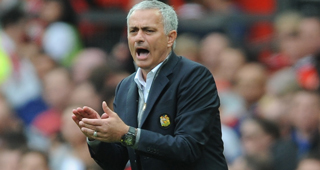It’s difficult to say when José Mourinho is losing it. Well, except for when it’s so obvious it doesn’t need to be said: simmering locker room resentments spill over into public; he gets especially snippy with the press and starts dropping several conspiracy theories and recriminations in a single breath; he sells out players he doesn’t like or trust. But the exact point at which Mou’s hold on a squad dissipates is a mysterious thing.
He and Sergio Ramos didn’t get along throughout his Real Madrid tenure, but Ramos put in some of the best seasons of his career with the midfield protection Mourinho’s tactical scheme afforded him. Then something broke, the relationship got spectacularly ugly, half the team revolted, and for nearly an entire miserable season, it was clear Mou was done at Madrid. The Portuguese’s first spell at Chelsea was a continually uneasy (if productive) clash of blimp-sized heads that Mourinho lost to Roman Abramovich and in Mou’s Chelsea return he whipped the squad into shape then seemingly kept on whipping for the sake of it. By the end, his players looked, not just tired, but spent on a metaphysical level.
It works right up until it doesn’t with Mourinho and perhaps his failures are hard to locate and characterize because he’s the rare manager who is both wily and lunatic. Louis Van Gaal is simply a crazy person and Pep Guardiola breaks out a set of psychic calipers to measure nearly every statement he makes, but Mou sometimes acts out of his mind for effect, which is easy to confuse with instances in which he’s princely popping off about some grievance legible only to him. He works the refs, inspires his players, and boxes with god, sometimes all at once, and while it undeniably gets results, it eventually wears everyone else out. Mourinho isn’t often wrong, precisely—he’s too much.
But this is new: Mourinho has never walked into a club and not provided an immediate boost. Manchester United are underperforming, to be sure, and an eleven-point gap between them and league-leading Chelsea all but ensures Mou isn’t going to win an EPL title this season. Even more troublingly, United look like a hater’s caricature of a Mourinho team: reasonably solid in defense but vulnerable because of how much defending they have to do against good opponents, and in possession, they rely more on individual brilliance than any animating idea about spacing and movement. Paul Pogba is an immensely talented in-betweener, not quite a box-to-box workhorse nor an attacking midfielder, and Mourinho hasn’t helped him assume a constant identity. United’s back line lacks continuity, in part due to injury but also because Mou has fiddled with the lineup and appears unhappy with the available options. Zlatan might finally be washed up. Henrikh Mkhitaryan is in the doghouse. Marcus Rashford is young and inconsistent.
There’s the strong possibility that this squad isn’t great, and the weakish excuse that United have been unlucky in some key matches, but there’s also Mourinho getting kicked out of two recent games for antagonizing referees and the fact that United have looked both shaky (humdrum draws against Arsenal and Liverpool) and downright awful (an 0-4 desecration at Chelsea’s hands) against England’s upper tier. It’s still early yet, but the Mourinho exit trajectory usually involves struggle, then a sudden opening up of the earth. This could break bad at any moment.
What might hold this faltering project together is Mou’s fervent desire for validation. This is a silly thing on its face: of course José Mourinho is a phenomenal manager, of course he’s a crucial figure in the sport’s history. Why is he still seeking out plaudits as if he were some haughty striver? Mou’s problem, which he won’t ever completely solve, is that he’s broadly despised and when you’re broadly despised, fans and media treat your every failure as if it were a referendum on your expertise. Mou’s style has never been en vogue: he’s a pragmatist in an era of highly celebrated manager-poets like Pep and Jurgen Klopp. And besides that, he’s unpleasant. He doesn’t apologize for his arrogance. Even his charm is adversarial. Mou invites some of the venom and critique he receives. He cultivates doubters and enemies as a means of staying sharp. But you also get the sense that the antipathy eats at him. He reads it as a lack of respect.
The reason he wanted the United job in the first place is because it’s a high perch, perhaps the biggest of big deal gigs in world soccer, one that backroom whisperers at Old Trafford claimed he would never get due to his temperament. When Mourinho left Inter for Madrid, he said that if you don't coach Real Madrid then you will always have a gap in your career. He covets status, because status is a way into legitimacy and being understood as legitimate is the next best thing to being beloved, which Mou has the self-awareness to know he’s too prickly to achieve.
In other words, he will fight for success at United in a way he might not at any other club. He’s apt to throw up his hands, blame several players and executives, and walk out of a job with his nose in the air when the going gets tough, but United is different. He needs to make it work, at least for a while, in Manchester as a kind of cosmic résumé-bolstering exercise. Rendering his greatness inarguable is his singular obsession. And the object of José Mourinho’s fixation usually ends up in his hands, by hook or by a nil-nil second leg draw in a tournament semifinal. At 53, having coached all over Europe, there’s not much we don’t know about The Special One. What we’re about to find out, as he tries to do right in the seat Alex Ferguson occupied not so long ago, is if his desire can outpace his ego.



